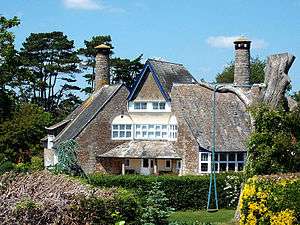Butterfly plan
_(14783761113).jpg)
A Butterfly plan, also known as a Double Suntrap plan, is a type of architectural plan in which two or more wings of a house are constructed at an angle to the core, usually at approximately 45 degrees to the wall of the core building.[1] It was used primarily in late Victorian architecture and during the early Arts and Crafts movement.
History
Westwood House, Worcestershire, was a 17-century precursor.[2] After the original, rectangular house was begun c. 1612, four diagonal wings were added at some time later in the same century.[3]
Victorian interest in the plan originated in the 1891 remodelling of Chesters, Northumberland, by Norman Shaw.[2] To the original, square house of 1771 he added five wings; three of these were diagonal, creating suntrap flanks for the south and west fronts.[4]
Notable Arts and Crafts examples:
- The Barn, Exmouth, Devon, by Edward Schroeder Prior (1897)[5]
- Happisburgh Manor, Happisburgh, Norfolk, by Detmar Blow to a concept by Ernest Gimson (1900)[6]
- Papillon Hall, Lubenham, Leicestershire, by Edwin Lutyens (1902–4, demolished in 1950)[7]
- Home Place, Kelling, Norfolk, by Edward Schroeder Prior (1903–4)[8]
- Kelling Hall, Kelling, Norfolk, by Edward Maufe (1913)[9]
- Yaffle Hill, Broadstone, Dorset, by Edward Maufe (1930)[10]
Gallery
References
- ↑ English Heritage Online thesaurus butterfly plan
- 1 2 Beckett, Matthew (24 October 2012). "The Butterfly House". New architecture blog. Country Life. Retrieved 24 October 2015.
- ↑ Brooks, Alan; Pevsner, Nikolaus (2007). The Buildings of England: Worcestershire. New Haven: Yale University Press. pp. 653–56. ISBN 978-0-300-11298-6.
- ↑ Historic England. "Chesters (1155585)". National Heritage List for England. Retrieved 24 October 2015.
- ↑ Historic England. "The Barn (1164569)". National Heritage List for England. Retrieved 25 October 2015.
- ↑ Drury, Michael (2000), Wandering Architects: In Pursuit of the Arts and Crafts Ideal, Shaun Tyas. ISBN 190028913X
- ↑ Cantor, Leonard (1998), Historic Country Houses in Leicestershire and Rutland. Kairos Press. ISBN 1871344182
- ↑ Historic England. "Thornfield residential home for the elderly (1049826)". National Heritage List for England. Retrieved 25 October 2015.
- ↑ Historic England. "Kelling Hall (1151974)". National Heritage List for England. Retrieved 25 October 2015.
- ↑ Historic England. "Yaffle House and attached screen wall (1275360)". National Heritage List for England. Retrieved 25 October 2015.

